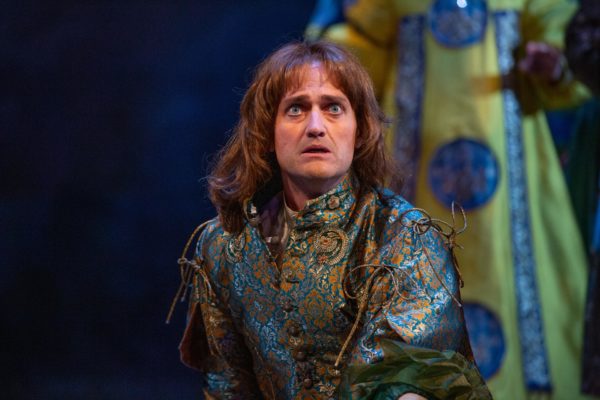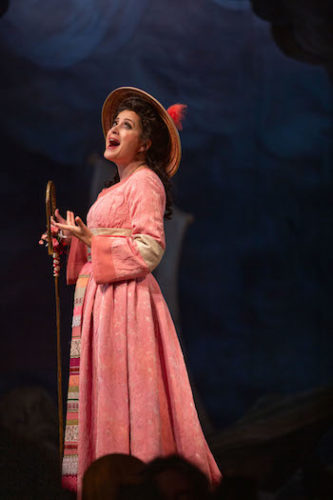Opera Review: Boston Early Music Opera’s “Orlando” — Divine Madness
By Susan Miron
This entertaining opera is a real soap opera, given that it chronicles the fallout of the passionate protagonist’s unrequited love.

Aaron Sheehan as Orlando in the Boston Early Music Festival production of “Orlando generoso.” Photo: Kathy Wittman.
Opera lovers like me try never to miss a Boston Early Music opera production, which occur in June every other year, with chamber operas performed every year on Thanksgiving weekend. In nine years, I think I’ve heard and enjoyed them all. This year’s featured opera, Agostino Steffani’s Orlando, is the highlight of week of concerts (through June 16), master classes, and a world-class exhibition. The theme of BEMF’s twentieth biennial festival is Dreams and Madness, and the topic of mania (of some sort) is reflected in several of its recitals and concerts. This very entertaining opera (composed in 1691) revolves around the madness of love and it is making its long-overdue North American premiere at Boston’s Emerson Cutler Majestic Theater this week, with performances on June 12, 14, and 16.
Orlando comically explores the eponymous character’s descent into derangement. This opera is a real soap opera, given that it chronicles the fallout of the passionate protagonist’s unrequited love (or is it an over-the-top unrequited crush?) for Angelica (Amanda Forsythe). The guy is presumed to be imprisoned; he then makes a return to mental health. Based on Ludovico Ariosto’s 1516 epic poem Orlando Furioso, the opera was an immediate success in Hanover and then in Hamburg. (Steffani spent his adult years in Germany.) “All operas in this era were spectacles,” BEMF’s Stephen Stubbs writes in the program notes. “Scenes change in an instant. While there is a deeply psychological trauma… it was meant to be a delightful entertainment.” And so it was, by and large. Steffani was an astute observer of human nature; his music adroitly expresses his characters’ personalities and dreams. The opera’s last words (about 4 hours after it begins) are “A heart that hopes will always be the victor.”
The excellent pre-concert lecturer, Colin Timms, pointed out that the closest musical parallel to Steffani was the British composer Henry Purcell. (Chronologically, Orlando falls between Purcell’s Dido and Aeneas and The Fairy Queen.) Steffani’s work also unmistakably shows the influence of French opera and courtly dance. Dance Director Melinda Sullivan’s eight Baroque dancers play a huge role in this production (choreographed by Marie-Nathalie Lacoursière); they are onstage much of the time and take on many different roles, including mechanical dolls. Also present: large flying objects, such as the sorcerer Atlante’s (Jesse Blumberg) hippogryph ( a legendary creature who is made up of the front half of an eagle and the hind half of a horse).

Amanda Forsythe as Angelica in the Boston Early Music Festival production of “Orlando generoso” Photo:Kathy Wittman.
BEMF puts considerable resources into these productions, and it shows. This is a seriously dedicated troupe; thanks in large part to the team of Paul O’Dette and Stephen Stubbs, the Artistic and Musical Co-Directors, the same immensely gifted people are involved year after year. One can always safely expect the participation of outstanding singers and musicians. The team of Orchestra Director Robert Mealy, Dance Director Sullivan, and Opera Director Gilbert Blin pretty well assure that these productions will be memorable for the ear and eye. For this lush staging, they deploy a variety of flying objects, including the aforementioned hippogryph. I wasn’t taken with much of the scenery, but the costumes are wonderful. (The production’s color scheme generally reflects the location of more than half of the narrative, which takes place in China. Chinoiserie was very popular when this opera was written).
Orlando is beset with a troubling choice common to heroes of his time. On the one hand, there is glory (public, military); on the other hand, there is honor (love). Steffani is a master of musical characterization. His score nimbly mixes French and Italian styles; he succeeds in expressing the struggle between glory and honor in his psychological portraits. Yet another terrific but neglected composer discovered — thanks to BEMF.
The singers are uniformly excellent, both as vocalists trudging through some really difficult, highly ornamented music, and as actors. Soprano Amanda Forsythe is familiar to local audiences (I’ve heard her three times in the past few months). She is often referred to as Boston’s ‘beloved’ Amanda Forsythe. She usually stars in productions that require a fabulous coloratura soprano, and rarely disappoints. Amanda here takes on the role of Angelica, the wife of Medoro, who was played by the outstanding countertenor Kasper Szelazek. This is a real dream team. The fabulous (and award-winning) tenor Aaron Sheehan, veteran of many BEMF operas, sang brilliantly and acted up a storm as the crazed-with-love Orlando. (He has a superb new CD on Naxos entitled Total Eclipse: Music for Handel’s Tenor with Stephen Stubbs and the Pacific MasterWorks Orchestra.) Among the fine singers were Emőke Baráth, who was a passionate Bradamante, Brunello (Zachary Wilder, at his hilarious best), Ruggiero (Christopher Lowrey), the sorceress Melissa (Teresa Wakim, who had a staff of 9 helping spirits) and the king of Galafro (Flavio Ferri-Benedett).
The BEMF Orchestra is its usual admirable self, especially the bassoons (Domenic Teresi and Allen Hamrick), oboes (Gonzalo X. Ruiz and Kathryn Montoya) and concertmaster Robert Mealy. The continuo section was fabulous, especially the harpist Maxine Eilander, who played wonderfully throughout on the beastly difficult to master Baroque harp. Also worthy of note: Paul O’Dette (theorbo), Stephen Stubbs (Baroque guitar), and Michael Sponseller (harpsichord). Suffice it to say that the instrumentalists are members in good standing on the A Team of Baroque Players.
Susan Miron, a harpist, has been a book reviewer for over 30 years for a large variety of literary publications and newspapers. Her fields of expertise were East and Central European, Irish, and Israeli literature. Susan covers classical music for The Arts Fuse and The Boston Musical Intelligencer.
Tagged: Boston Early Music Festival, Orlando

